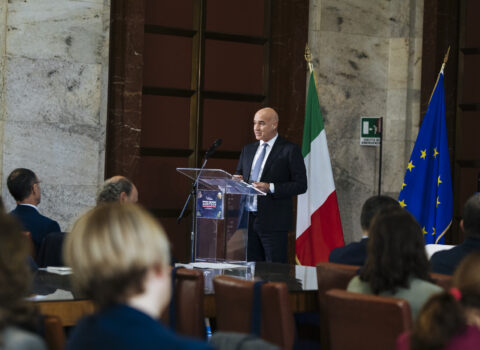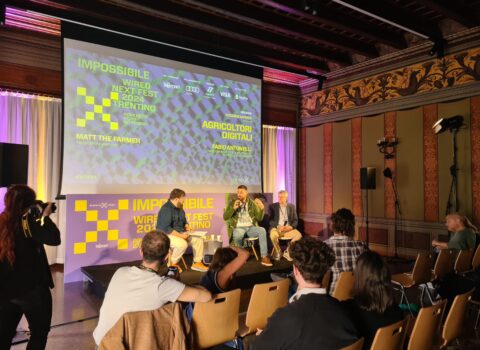
February 2025: The FBK projects making headlines
An overview of FBK's innovative projects covered by the media in the past month: focus on Agritech and digital health
The month of February was full of relevant meetings, events and publications.
The Ministry of Enterprise and Made in Italy in Rome hosted the annual FBK research presentation event dedicated this year to “Human-Centered Agritech. Research and development for people and the environment”. An opportunity to deepen agriculture 4.0 and tell institutions, companies and experts about the major national and international research projects carried out in this field by Fondazione Bruno Kessler, building on its decades of experience in artificial intelligence, interdisciplinary approach and ability to translate scientific results into application solutions. There have been many high impact publications on the life of society, such as the one on theArtificial Intelligence algorithm that can predict the risk of falls and disease fluctuations in patients with Parkinson ‘sdisease.
Human-Centered Agritech. Research and development for people and the environment”.
The annual FBK event held on February 11, 2025 at the Ministry of Enterprise and Made in Italy in Rome and dedicated to Agritech was recounted and shared by many newspapers, in the press, on television and on social media.
President Ferruccio Resta was featured at the TG1 national TV news show together with Chiara Corbo, director of Osservatorio Smart Agrifood Politecnico di Milano, to talk about Artificial Intelligence in Agriculture: “Agritech is a great asset: we are the first country in Europe for added value and we must preserve it and stay ahead of the rest of the world in terms of innovation” Ferruccio Resta explained.
Il Sole 24 Ore newspaper, in its Agrisole special edition, shared and elaborated on some data that emerged during the event thanks to the talks of the expert guests of the day: “despite the European record (42.4 billion euros of added value in 2024 according to Istat) Italy, today, boasts only 8% of digitally mature farms and 9.5% of 4.0 agricultural areas.”
ANSA, in its launch titled “Agritech, the future of Italian agriculture is enabled by AI,” also picked up on FBK’s event and in particular President Ferruccio Resta’s alk, “Today’s threats to agriculture come not only from crows, but from far more complex challenges such as drought, resource waste, market volatility, climate crisis, demographic dynamics and labor crisis. The technologies to address these issues already exist and are “AI, drones and sensors, autonomous vehicles, data analysis tools” with which it is possible to monitor the soil, predict changes and optimize resources”.
Speciale TG1 at 07:00 am on February 11, 2025 – Rai 1
Ansa – Agritech, il futuro dell’agricoltura italiana passa per l’IA – February 21, 2025
Digital leap on the fields to remain EU leader
Agriculture 4.0 is holding its breath after a great deal of growth, aided by farm fragmentation and reduced incentives. Fabio Antonelli, head of digital agriculture projects at FBK – interviewed together with President Ferruccio Resta on the pages of Affari e Finanza – La Repubblica newspaper – highlighted the key role of digital technologies for precision agriculture. In particular, he described the use of smart tractors with prescription maps, field sensors and satellite imagery or drones to optimize the use of resources such as water and crop protection agents. Antonelli stressed that the integration of these technologies improves the profitability of farms, contributing to the automation of processes and the collection of data for more efficient decisions.
La Repubblica Affari e Finanza – Scatto digitale sui campi per restare leader UE – February 3, 2025
Technologies to defend agriculture from the climate crisis
Guest of Innov-action on SkyTg24, Paolo Traverso talked about Agriclima, a national project led by FBK. The goal is to create a technology and digital platform to collect, manage and share data on climate change, with a focus on the effects on agriculture. In addition to collecting key data, Agriclima aims to analyze critical issues and develop artificial intelligence-based solutions to mitigate the impact of climate change ambition. “At FBK, we are committed to building an ecosystem that will combine research centers like ours and innovative companies, collaborating to develop solutions and increase awareness,” Traverso said.
Parkinson’s disease: an algorithm detects falls and motor alterations
A result of great impact achieved also thanks to Fondazione Bruno Kessler’s research, which has played a central role in the development of an innovative Artificial Intelligence algorithm capable of predicting the risk of falls in patients with Parkinson’s disease. The project, coordinated by the Trento Province Healthcare System, saw the contribution of FBK in the advanced analysis of data and the creation of predictive models, using machine learning techniques.
As ANSA reported, this technology makes it possible to identify motor fluctuations in patients in advance, offering concrete support for disease management. Adnkronos pointed out that FBK experts worked on the digitization and structuring of clinical data, identifying useful patterns to improve therapy effectiveness. Rainews highlighted that, thanks to this algorithm, it will be possible to provide more timely care, personalizing therapies and reducing the risk of falls in patients, thus improving their quality of life.
ANSA – Parkinson, sviluppato algoritmo che prevede i rischi di cadute – February 1, 2025
Adnkronos -Malattia Parkinson, algoritmo ‘made in Italy’ prevede rischio cadute – February 1, 2025




